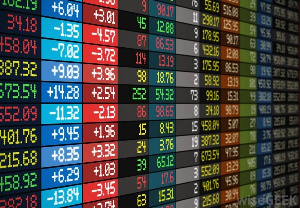Last week the Ghana Stock Exchange commemorated its 30th anniversary having commenced trading on November 12, 1990. While there is plenty to celebrate in terms of its achievements as an institution for mobilizing long term capital for business financing and enriching investors in this process, most equity investors on the market currently are not particularly enthused with the way the values of the share holdings are contracting.
Between the start of 2020 and November 12, the GSE Composite Index (CSE – CI) which tracks the weighted average price change for all the equities listed on the stockmarket, had fallen by 19.29 percent while the GSE Financial Index (GSE-FI) which tracks the weighted average change in the financial services sector’s listed equities had fallen by 19.63 percent.
The GSE ‘s market capitalization which is the value of all the listed stocks had fallen by 6.47 percent over the period. Considering that generally, share prices have been falling, equity investors can only look with envy at their counterparts invested in fixed income securities who this year, are earning between 13.80 percent for those holding 91 day treasury bills; to over 20 percent for those holding long dated government bonds of 10 or 15 years tenor, or medium term corporate bonds with tenors averaging five years.
Stockmarkets rise and fall in cycles referred to as bull and bear markets respectively. The GSE’s problem is that the current bear market has been inordinately long-liived. About a decade ago, the current Finance Minister, Ken Ofori Atta – at the time the Executive Chairman of Databank, one of Ghana’s oldest, largest and most successful investment banking groups – famously declared that over any three consecutive year period since the GSE was established the GSE-CI has outperformed treasury bills. At that time it was true, but not anymore; over the three year period 2018 to 2020 the GSE-CI has fallen continuously, making for the longest bear market in the GSE’s history.
But Ghana’s bourse has repeatedly shown during the course of its three decade history that it can outperform most other stockmarkets around the world. The most remarkable bull markets were In 1993 when the GSE-CI rose by 113.73 percent and this was followed by a further 124.35 percent rise in 1994; and similarly in 2003, when it rose by 154.67 percent, followed by a further 91.33 percent rise in 2004. Instructively the GSE turned out to be the best performing stockmarket in the world during both periods.
The most recent bull market was in 2017 when the index climbed by 52.73 percent (with the financial index rising by 49.51 percent) following the release of private pension fund contributions hitherto held temporarily by the Bank of Ghana and invested in government debt securities to the respective scheme owners and their fund managers. Those funds were invested largely in equities propelling their prices upwards.
Since then however the GSE has been caught in the grip of its strongest bear market so far, falling marginally by 0.29 percent in 2018 before plummeting by 12.25 percent in 2019.
Equity investment is such that active investors who regularly buy and sell shares in order to maximize their capital gains from favorable share price movements tend to have herd instincts; when prices are rising they buy and when they are falling they sell. This reinforces both bull and bear markets whenever either one occurs and so currently sell orders are prevailing pushing share prices further downwards.
However the most astute investors are those that buy just before share prices bottom out and begin to rise – that is just before a bear market transforms into a bull market. This happens when share prices become clearly undervalued and investors realize it.
The GSE ‘s management, supported by most equity analysts argue that this is the case with the stockmarket currently and indeed the data supports this assertion. Price earnings ratios (P/E) – which measure the number of years required for the current earnings per share from the issuing company’s profits to match the current share price – are at a long term low for many stocks.
Some examples: CAL Bank’s P/E is 2, implying an investment yield of 50 percent; Ecobank Ghana, GCB Bank and Enterprise Group all have a P/E of 3, translating to an investment yield of 33 percent; Standard Chartered Bank has an P/E of 4, giving an investment yield of 25 percent; and to top them all Ecobank Transnational Incorporated has an P/E of 1, meaning an investment yield of 100 percent.
To be sure any fall in share price for such stocks dilutes the returns on investment but considering that the GSE has a long term average P/E ratio of between four and six, the prices of those stocks are meant to be rising not falling. Sooner than later, this will happen as proper share price valuation replaces basic herd instinct.
Standing in the way of is happening however is Ghana’s high interest rate structure. Simply put, most investors prefer the current investment returns of between 13.8 percent and about 20 percent on government’s risk free debt securities (the actual rate depending on the tenor) and the even higher yields on listed corporate bond which carry relatively low risk, to the much higher risk implicit with equity investments which could fail to pay dividends and whose prices can fall (as has been happening since last year) rather than rise.
Here, Ekow Afezie, the GSE’s Managing Director admits that it is a victim of its own success in that the Ghana Fixed Income Market which it established in 2015 to trade in government and corporate debt securities has become a smashing success. Not only are there lots of securities offering high yields to trade in – but trading volumes have quadrupled over the past couple of years, making GFIM highly liquid. This has attracted investors who can now lock into the higher yields offered by relatively long tenured securities, in the knowledge that they can divest their holdings any time they want on a vibrant secondary market. The snag is that many of the investors being attracted are selling their equity holdings to raise the investment capital they are subsequently ploughing into fixed income debt securities.
The GSE’S management is now looking to two types of investor to prop up the equities market. One is institutional investors – particularly life insurance companies and pension funds whose monies are chiefly long term as well as unit trust schemes and mutual funds, some of which are established specifically to invest in equities.
The other is retail investors, such as households and individuals. The importance of this class of investor was illustrated by MTN Ghana’s Initial Public Offer in 2018 which specifically targeted them and generated well over GHc1 billion in what was the largest IPO ever done on the GSE.
To get more retail investors into equities it is now planning to establish an over the counter market. An Over the Counter (OTC) market refers to the process by which securities are traded for companies that are not listed on a formal stock exchange. Securities traded OTC are done so via a broker-dealer network as opposed to a centralized exchange. These securities do not meet the requirements to have a listing on a standard stock exchange, but offer variety, ease of transaction and some of them will bring the attractiveness of household corporate names. The GSE ‘s proposals for the OTC market are currently being examined by the capital market regulator, the Securities and Exchange Commission which has to approve them before implementation can begin, expectedly from early 2021.
The OTC will expand the size of Ghana’s retail market for equities which has been growing steadily. Unlike during the predominantly foreign investor-driven first decade of the GSE’s existence, domestic investors – who will use the OTC – have risen to about 219,000 compared to slightly over 1,000 foreign investors. Importantly though, the relative stability of the cedi in recent times, by minimizing the spectre of foreign exchange losses, is making the GSE more attractive to foreign institutional investors again.
Retail investors tend to buy and hold in order to get annual dividends rather than regularly trade their holdings and so this would reduce the effect of the herd instinct during bear markets.
But even as the GSE grapples with the inordinately long ongoing bear market it has plenty to celebrate as it commemorates its 30th anniversary. Over the past three decades it has seen some 8,687.45 million shares traded on its platform – which during that time has been transformed from manual to completely electronic remote trading – with a cumulative value of GHc4,945 million.
Source: Goldstree Business
 Home Of Ghana News Ghana News, Entertainment And More
Home Of Ghana News Ghana News, Entertainment And More





